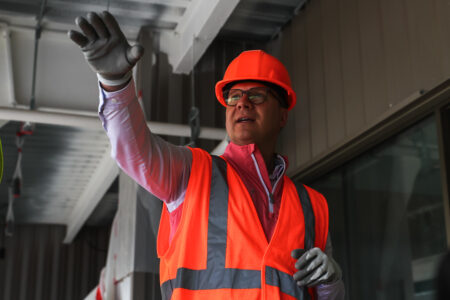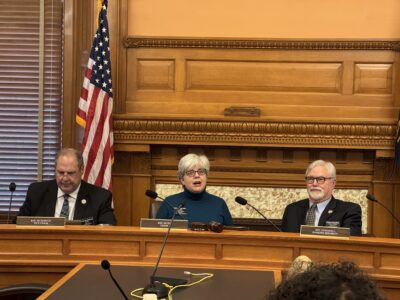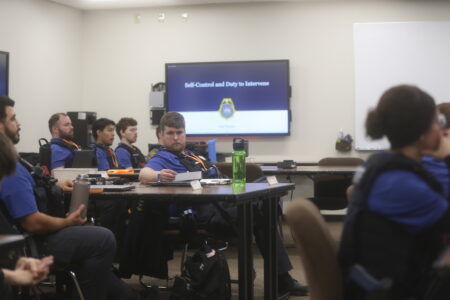Goff has ‘incredible confidence’ in timeline for second phase of Gateway project after KU’s big week

photo by: Sarah Buchanan/Special to the Journal-World
Kansas athletic director Travis Goff addresses media on a tour of David Booth Kansas Memorial Stadium on Friday, April 25, 2025.
Kansas athletic director Travis Goff said on Thursday that KU’s “confidence has increased dramatically” in beginning construction on the second phase of its Gateway project following the 2025 football season, after a pair of key developments that took place over a pivotal two-day span for the athletic department.
On Tuesday, Lawrence city commissioners approved a package of financial incentives worth $94.6 million, including Tax Increment Financing and STAR bond districts, that will help the project move forward; on Wednesday, KU’s longtime donor David Booth gave the university $75 million for the project as part of an overall $300 million donation. That’s not to mention a previous gift of $25 million from Paul and Linda DeBruce a week beforehand.
Following those developments, which should account for more than half of the second phase’s price tag — KU’s agreement with the city positioned the $94.6 million as 27% of the phase’s total costs — Goff said of KU, “We roll with incredible confidence.”
“Now, there’s still work,” he added. “So I couldn’t sit here and tell you definitively what it’s going to be in the precise definition, but I can tell you with confidence we are into conceptual design, that architect team and the entirety of the development team is working, gosh, full days to say the least, and the objective, of course — this has been stated, so I’ll just reinforce it — is to demo after the season.”
And when demolition begins on the east side of the stadium, making way for the remaining 30% of the new venue as well as housing, retail, entertainment and the rest of the planned second phase, KU will continue to play in its facility: “We’re going to be in this stadium again next fall,” Goff said.
What exactly the stadium looks like when they are playing in it during the 2026 season has yet to be determined, but Goff’s contention is that KU “didn’t cut any corners” on the north or west sides during its first phase and that for it to maintain the same level of diligence in the east, it will not be able to have everything done by the fall of 2026.
“I don’t know how you can do it right, rush it in seven, eight months, have nailed it to do that once-in-a-lifetime chance, and have it all completed,” he said. “So I think we’ll be playing through a little construction, I think we’ll have a little bit of reduced capacity over there, and I’m fired up about that. Nothing apologetic about it. I’m like, let’s do it right, we’ll play through it, and it’ll be worth every bit of quasi-inconvenience that provides.”
It will be a different sort of inconvenience than in 2024, when KU elected not to play through construction at David Booth Kansas Memorial Stadium during the first phase of the Gateway project because of how much playing each game would have set back the project. The Jayhawks instead played their games at Children’s Mercy Park and GEHA Field at Arrowhead Stadium, both in the Kansas City area, but KU officials said in the months following that season that future construction would not necessitate moving games out of Lawrence.
Most immediately, KU is about to play its 2025 campaign in a stadium that is 70% new, and Goff has frequently stated that the unfinished east side serves as a constant reminder that work remains to be done. He noted on Thursday that network cameras will face that side during television broadcasts this season.
“I kind of like this notion of, we’re remembering where we’ve been, and in a lot of ways we’re still reminding ourselves that we’ve got work to do,” Goff said. “None of us are taking the foot off the gas just because of Mr. Booth’s incredible gift and that announcement, or the city municipal step that took place Tuesday night. I mean, there’s still work to be done, and I think that reminder will be good for us all fall.”
Other notes from Goff’s meeting with reporters on Thursday:
• He said that for KU to try to carry out the rest of its project “on an island” without municipal support would have been quite difficult, and expressed gratitude for the commissioners’ vote.
“I think it certainly indicates that we, without question, reached across the aisle and are finding ways through this agreement to really drive direct impact to Lawrence,” Goff said. “Not just projected economic impact, but the other things that are in that agreement are very real, and they’re indicative of KU’s desire to make Lawrence a better place.”
That was an apparent reference to provisions in the development agreement that will have KU provide land to the city for use in affordable housing projects and will also help fund improvements to stormwater systems and the Ninth Street corridor, as the Journal-World has reported.
• Goff touched on the remaining $225 million from Booth’s donation, referring to it as a possible “fixed income stream” that will remain untapped so KU can “benefit for years to come,” echoing sentiments expressed in Thursday’s press release announcing the gift.
Goff said that money could help the department share revenue with its athletes, under the new system implemented by House v. NCAA (which features a cap of $20.5 million that will increase each year), and could also contribute to yet-unforeseen expenses in the ever-changing world of college athletics.
“It is unrestricted in nature,” he said, “and we’re excited to know that it’s going to provide what I describe as differentiating resources in a climate where everybody’s fighting and scratching to be competitive and to fuel their programs.”







